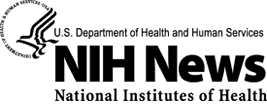Last updated: November 08, 2011
eMERGE network moves closer to tailored treatments based on patients' genomic information

National Human Genome Research Institute
www.genome.gov
eMERGE network moves closer to tailored treatments based on patients' genomic information
NIH-supported project expands into clinic

"Our goal is to connect genomic information to high quality data in electronic medical records during the clinical care of patients. This will help us identify the genetic contributions to disease," said NHGRI Director Eric D. Green, M.D., Ph.D. "We can then equip health care workers everywhere with the information and tools that they need to apply genomic knowledge to patient care."
The first phase of eMERGE, which wrapped up in July, demonstrated that data about disease characteristics in electronic medical records and patient's genetic information can be used in large genetic studies. So far, the eMERGE network has identified genetic variants associated with dementia, cataracts, high-density lipoprotein (HDL) cholesterol, peripheral arterial disease, white blood cell count, type 2 diabetes and cardiac conduction defects.
In the next phase, investigators will identify genetic variants associated with 40 more disease characteristics and symptoms, using genome-wide association studies across the entire eMERGE network. DNA from about 32,000 participants will be analyzed in each study. Genome-wide association studies represent a powerful approach researchers can use to study hundreds of thousands of genetic variants in people with and without certain health conditions to identify genes that cause or contribute to diseases.
eMERGE researchers will then use the genomic information in clinical care. With patient consent, researchers may use information about genetic variants involved in drug response to adjust patient medications. In addition, eMERGE researchers who discover patients harboring genetic variants associated with diseases such as diabetes or cardiovascular disease will intervene to prevent, diagnose and/or treat such diseases.
eMERGE investigators will also:
- integrate privacy protection methods into their research and patient clinical care to reduce the risk of identifying patients.
- establish a consent and consultation group to study consent and privacy concerns of study participants.
- examine public concerns about genomic research and electronic medical records.
"We are developing best practices and policies to determine how best to use patient information for research or patient care," said Teri Manolio, M.D., Ph.D., director of NHGRI's Office of Population Genomics, which administers the eMERGE network.
eMERGE network members and approximate amounts of funding awarded for fiscal year 2011 are:
- Vanderbilt University Medical Center, Nashville
Dan M. Roden, M.D.
$772,000. - Group Health Cooperative and University of Washington, Seattle
Eric B. Larson, M.D., and Gail P. Jarvik, M.D., Ph.D.
$823,000. - Northwestern University, Evanston, Ill.
Rex L. Chisholm, Ph.D., and Maureen E Smith, M.S.
$762,000. - Geisinger Weis Center for Research, Danville, Pa.
David J. Carey, Ph.D., and David H. Ledbetter, Ph.D.
$841,000. - Essentia Institute of Rural Health, Duluth, Minn.
Catherine A. McCarty, Ph.D., M.P.H.
$773,000. - Mayo Clinic, Rochester, Minn.
Iftikhar Kullo, M.D. and Christopher G. Chute, M.D., Dr. P.H.
$788,000. - Mount Sinai School of Medicine, New York City
Erwin P. Bottinger, M.D.
$847,000.
Vanderbilt University will also receive $846,000 in fiscal year 2011 to establish the eMERGE coordinating center for supporting and facilitating the work by network investigators. Jonathan L. Haines, Ph.D., will lead this effort.
In spring 2012, NHGRI plans to award up to $1.6 million to as many as three investigators for three-year pediatric eMERGE studies. Another NIH institute, The Eunice Kennedy Shriver National Institute of Child Health and Human Development, plans to co-fund these grants with NHGRI.
The eMERGE network will share its data through the database of Genotypes and Phenotypes (dbGAP) at dbGAP. For more information about the eMERGE network, please go to eMERGE.
NHGRI is one of the 27 institutes and centers at NIH. The NHGRI Division of Extramural Research supports grants for research and training and career development at sites nationwide. Additional information about NHGRI can be found at www.genome.gov.
About the National Institutes of Health (NIH): NIH, the nation's medical research agency, includes 27 Institutes and Centers and is a component of the U.S. Department of Health and Human Services. NIH is the primary federal agency conducting and supporting basic, clinical, and translational medical research, and is investigating the causes, treatments, and cures for both common and rare diseases. For more information about NIH and its programs, visit www.nih.gov.
Contact:
Geoff Spencer
National Human Genome Research Institute
301-402-0911
spencerg@mail.nih.gov
